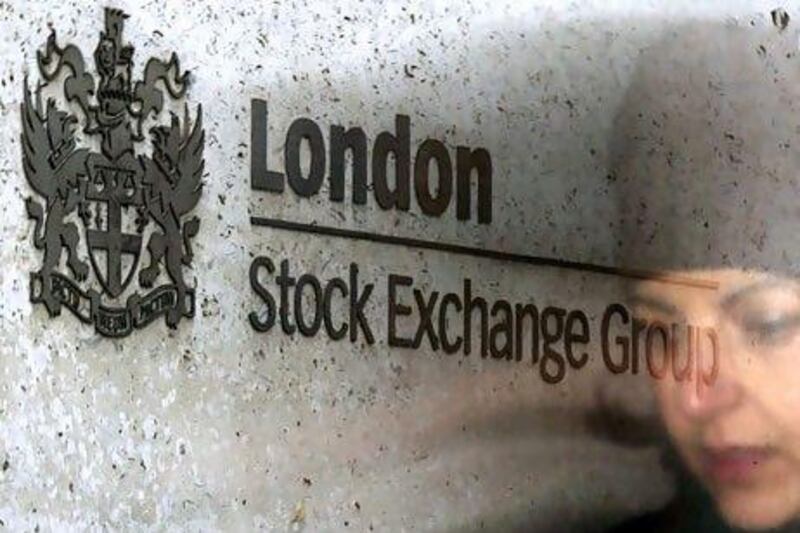The London Stock Exchange (LSE) is at a crossroads in its 210-year history. Dubai, which has a 20 per cent holding in the venerable institution, has just as much at stake at this critical juncture.
More Business news: Editor's pick of today's content
Abu Dhabi rents continue to slide in tenant-led market Abu Dhabi rental rates are down 25 to 40 per cent in many neighbourhoods, new data shows. Read article
Industry Insights // Messy Madoff legacy spreads far and wide Two new cases filed by Dubai-based investors against Standard Chartered in Singapore illustrate the widening global reach of claims involving Bernard Madoff's $65bn Ponzi scheme. Read article
Trust Tower takes up challenge to keep Abu Dhabi business area downtown Aldar Properties has started marketing office space in Trust Tower, a centerpiece in efforts to redevelop downtown Abu Dhabi - with gallery. read article
[ More business ]
The LSE's failure to clinch the so-called merger with TMX of Canada has effectively put up a "for sale" sign, and how Dubai reacts now will be crucial in determining the future of the London market, indeed global markets. Qatar, which has a 15 per cent stake, will also play a decisive role.
Xavier Rolet, the French chief executive of the LSE, finds himself potentially in the middle of an international auction. If he looks west, he sees Nasdaq OMX as a potential buyer. If he looks east, he sees SGX, the stock exchange of Singapore.
Neither New York nor Singapore has declared an intention to bid. In fact, they may not be the only potential bidders; both Hong Kong and Australia have exchanges that might want to tie up with the former "mother country" if the circumstances and the price are right.
But the accepted market wisdom is that either Nasdaq or SGX will make a move on the LSE. The New Yorkers are probably favourites at the moment, with the LSE making it known through "people familiar with the situation" that London would welcome an approach from across the Atlantic.
If that comes, it would be familiar ground for both parties. Nasdaq made three attempts to buy the LSE just a few years ago, when it was under the command of Clara Furse. With hindsight, she missed one of many golden opportunities; the shares were then around the £15 level, which they have not reached since. In afternoon trading yesterday they were at £10.64, up 5 pence.
There is a good deal of cultural synergy between New York and London; not as much as there would be between London and the older New York Stock Exchange, but NYSE has already committed itself to a deal with Deutsche Borse. There is also some bottom-line cost saving that Bob Greifeld, the combative Nasdaq chief executive, could carve out of London.
But it is harder to see the top-line strategic thinking behind a Nasdaq-LSE tie-up. In an era when economic power is generally thought to be heading eastwards, two western institutions shaking hands across the Atlantic seems passe, so pre-Lehman Brothers.
The smarter move for the LSE would be to look east. Under its chief executive Magnus Bocker (ex-Nasdaq), Singapore has big plans, as proved by its ambitious but aborted merger with the Australian exchange.
It is a big regional player, but will not be able to challenge Hong Kong, or the bigger long-term threat from Shanghai, without a quantum leap. A deal with the LSE might provide that.
Financially, it also makes more sense for Singapore. Nasdaq would have to leverage itself up to pay the £3 billion (Dh17.64bn) or so the LSE would expect; SGX could probably outbid the Americans if it came to a straight cash auction.
But which would the LSE, and its shareholders, prefer? This is where Dubai and Qatar come in. With 35 per cent between them, their decision will go a long way towards determining the fate of the LSE.
All shareholders want to see cash on the table. Dubai is no different. Having splashed out more than £15 per share in 2007 when it bought the stake (from Nasdaq), it would be delighted to minimise that paper loss as much as possible.
But there is also a global strategic issue at stake, and Dubai must consider this. Links between the emirate and Singapore go back a long way, with the dynamic island state providing much of the inspiration behind the UAE's economic development.
The UAE is also a convinced advocate of the "new Silk Road", which involves the thriving economies of China, India and South East Asia becoming the Middle East's natural business partners for the future.
Dubai has been a loyal and supportive shareholder of the LSE, even though its friendliness has not always been reciprocated. It voted for the now-defunct Canadian tie-up, I am told, even though the deal was thrust upon it without full consultation and was laden with regulatory problems.
The emirate will also be conscious of its alliance with the Americans in the Nasdaq Dubai exchange.
But on this occasion, when it has the opportunity (along with Qatar) to influence the course of global financial history, it should tell the LSE, politely but firmly, to say "no" to Nasdaq, and look eastwards.





